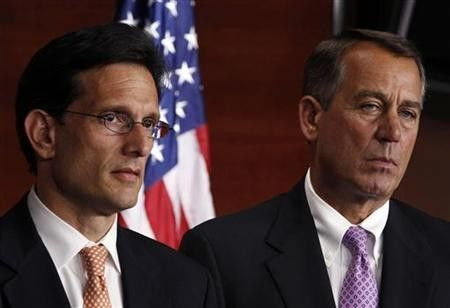Debt Deal: Republicans Set Out to 'Hurt Some People'
COLUMN

The absurdity engulfing Washington in the runup to a debt deal taught us many things about the modern Republican party, but perhaps the most illustrative moment did not occur in a floor speech; it involved a motivational movie.
In a plot to unify a Republican caucus divided by a rift between the relatively moderate leadership and the fiscal extremists, House Majority Whip Kevin McCarthy (R-CA) played a clip from the 2010 crime thriller "The Town" in which the protagonist seeks a friend's assistance:
"I need your help. I can't tell you what it is. You can never ask me about it later. And we're going to hurt some people."
You have to wonder whether the message here was explicit or whether Republican leadership was subconsciously announcing an ethos that is usually cloaked in the false rhetoric of populism. Either way, it was telling: for the 2011 version of the GOP, lockstep ideological purity trumps considering what is best for the American people. You do what you are supposed to do, even if that means hurting some people. "People" here means principally Democrats, but ordinary Americans are the ones who suffer.
The difference between this and prior versions of Republican intransigence is that it is no longer just Republican leadership that is dictating the terms. It is the ascendance of a Tea Party ideology holding that government can do no good, and that the only appropriate response to people proposing a dreaded expansion of government, whether it is environmental regulations or taxes, is unwavering resistance.
The sway of this contingent was on display in the frantic days preceding a deal, as a Tea Party-fueled insurrection sought to undercut proposal after proposal, including the forlorn framework advanced by the bipartisan Gang of Six and the Boehner-Obama Grand Bargain. They were willing to risk the cataclysmic repercussions of a U.S. default, and the hurt it entailed, for political gain. Much of the strategy came down to this: hurt Obama's reputation and his political standing.
Never mind the grave concerns being raised by economists about how sharply curtailing government spending while abandoning any hunt for revenue could exacerbate a slow economy, or the fact that the American people, when polled, consistently rank job creation above deficit reduction as a priority. When ideology needs your help, when you are in Congress to defend it, you can't ask about it later or worry whether you are hurting people.
Of course, society's "most productive members," or whatever euphemism you use to praise and defend the top earners who have emerged from a devastating recession mostly unscathed, will not be hurt.
The people who will be hurt are those who watch state and local governments cut back more and more services as the rich reap the benefits of increasingly inviolable Bush era tax cuts.
The people who will be hurt are those who risk being taken advantage of by the unscrupulous lending institutions that the much-reviled Dodd-Frank financial overhaul, particularly its Consumer Financial Protection Bureau, sought to hold to account.
The people who will be hurt are those whose health could be endangered by ambitious attempts to bludgeon the Environmental Protection Agency into ineffectiveness.
The no-taxes, end-regulations, starve-government nihilism that has consumed the Republican Party has become self-perpetuating. As to the people that it purports to help -- well, they might be in for some pain.
© Copyright IBTimes 2024. All rights reserved.





















